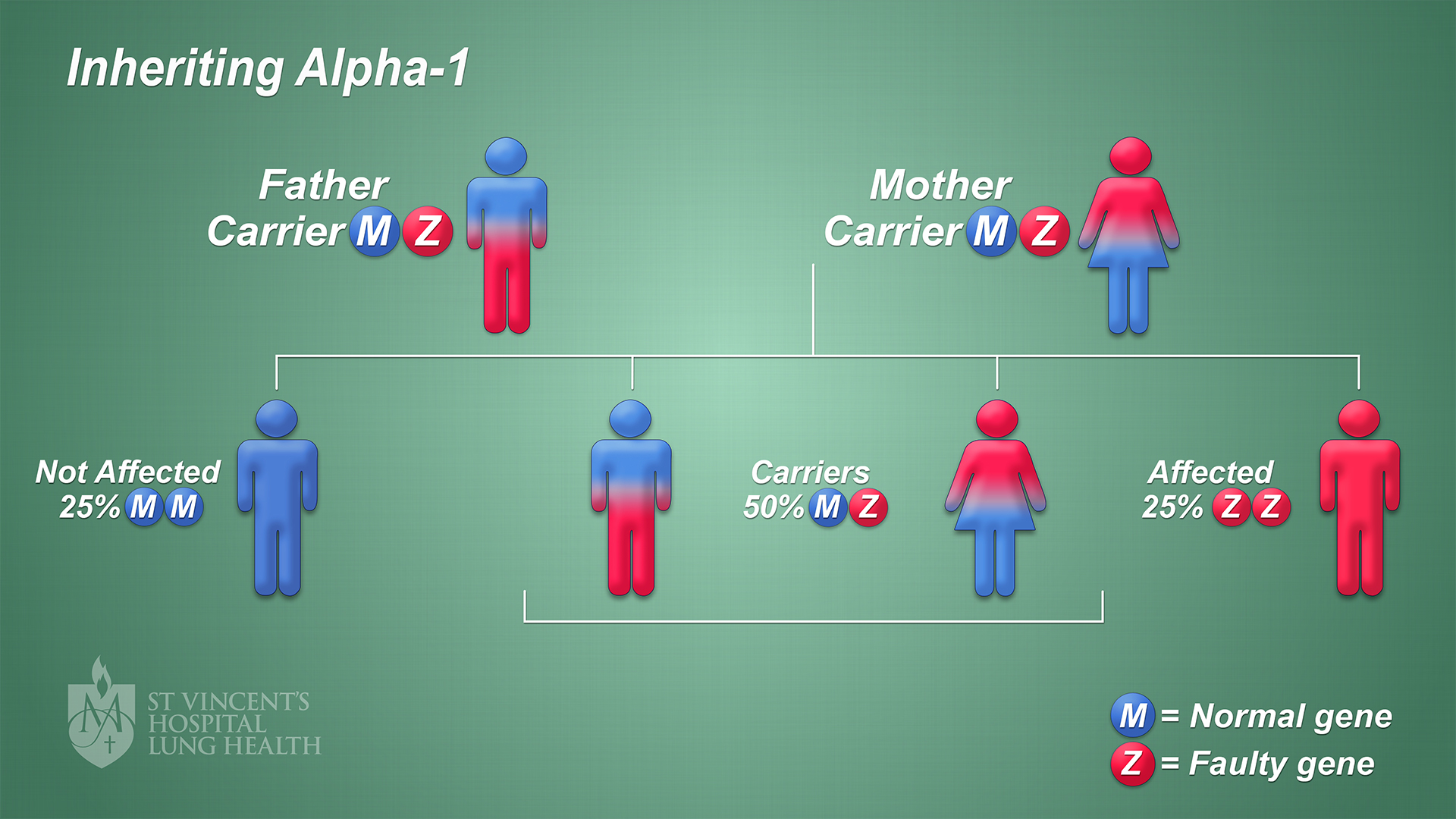Alpha -1 Antitrypsin Deficiency
What is Alpha-1 Antitrypsin Deficiency?
Alpha-1 Antitrypsin Deficiency, also known as ‘Alpha-1’, is an uncommon condition that causes lung and liver disease.
Everyone’s liver produces a protein called alpha-1 antitrypsin, or AAT. This protein circulates in your blood, around your body, helping to protect your lungs from damage.
If there isn’t enough AAT protein in the blood, your lungs are at risk of damage.
People with Alpha-1 may develop:
- emphysema
- bronchiectasis
- cirrhosis of the liver
Sometimes, the condition is not diagnosed at first and chronic obstructive pulmonary disease (COPD) may be diagnosed. Occasionally, people with Alpha-1 may also have asthma.
What causes Alpha-1 Antitrypsin Deficiency?
Everyone has two copies of AAT genes. One copy is passed to you from each parent.
If only one gene is faulty, you will be a carrier for Alpha-1.
Alpha-1 carriers may produce less AAT protein than normal – but they can still live healthy lives.
If both AAT genes are faulty, you will have Alpha-1 and may develop more serious lung symptoms.
In Australia, approximately:
- One in every nine people carry a faulty AAT gene
- One in every 2,500 people will inherit Alpha-1 Antitrypsin Deficiency.
The diagram below shows a mother and father who are both carriers of Alpha-1 (MZ). The mother and father have a 25% chance of their child not having Alpha-1 (MM), a 50% chance of their child being an Alpha-1 carrier, and a 25% chance of their child having Alpha-1 (ZZ).

What are the signs and symptoms of Alpha-1 Antitrypsin Deficiency?
Not everyone who has Alpha-1 Antitrypsin Deficiency will develop symptoms. Symptoms can differ between each person.
Some common respiratory symptoms include:
- Shortness of breath
- Reduced ability to exercise
- Frequent chest infections
- Persistent coughing or wheezing
- Excess sputum (phlegm)
- Early-onset emphysema
- Family history of lung issues.
What are the possible tests to diagnose Alpha-1 Antitrypsin Deficiency?
Alpha-1 Antitrypsin Deficiency is one of the most common inherited lung conditions in the world, but it is not often diagnosed because few clinicians are experienced in the condition - but the knowledge base is building.
If you have symptoms of Alpha-1 or a family history of Alpha-1, it’s important to have an Alpha-1 blood test.
To diagnose Alpha-1, your doctor will take a small blood sample – a procedure covered by Medicare in Australia.
The World Health Organisation recommends that all adolescents and adults with COPD and asthma should be screened for Alpha-1.
If your results suggest Alpha-1, you will need further genetic testing.
Early diagnosis is important, so you can:
- avoid risk factors that may make your lung health worse
- make positive lifestyle changes to protect your lungs
- reduce your symptoms
- slow the progression of any lung disease and help to improve your quality of life.
What are the possible procedures and treatments for Alpha-1 Antitrypsin Deficiency?
There is currently no cure for Alpha-1. Treatment is aimed at slowing the progression of the disease. Your doctor will develop a treatment plan based on your symptoms.
Treatment options include:
- Quitting smoking – to prevent further lung damage (phone 13QUIT to get started); this is the single most important strategy to avoid serious lung damage, as cigarette smoke turns on the enzymes that destroy lung tissue causing emphysema, and without Alpha-1 you have no protection
- Bronchodilators – medicine to widen your airways and help you breathe easier may help some people breathe more comfortably but will not alter the underlying condition
- Antibiotics – to manage chest infections
- Augmentation therapy – weekly infusions of alpha-1 antitrypsin concentrate, aiming to increase blood levels of AAT in the blood and lungs (this treatment is not suitable for everyone, so speak to your doctor). Alpha-1 augmentation therapy has been approved by the Therapeutic Goods Association (TGA) in Australia, however, it is currently not subsidised by Medicare
- Lung transplant – for selected people with end-stage lung disease.
What is the future plan if you have Alpha-1 Antitrypsin Deficiency?
If you’ve been diagnosed with Alpha-1, don’t feel disheartened. There are many treatments to help you live an active, healthy life.
Your plan may include:
- Regular respiratory tests – to monitor your progress
- Avoid triggers for lung disease – including cigarette smoke, both active and passive (second hand smoke from other people), fumes, dust and poor air quality
- See your doctor – especially if you develop a chest infection or cold
- Keep up to date with immunisations – to protect yourself against infectious lung diseases such as the flu and pneumonia
- Exercise regularly – to keep your lungs healthy and active
- Maintain a healthy diet – including fresh fruits, vegetables and whole grains to get adequate nutrition.
If you have any questions about Alpha-1, please speak to your doctor. You may also wish to visit the Alpha -1 Organisation Australia website for more resources.